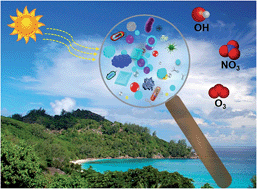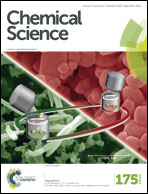Atmospheric chemistry of bioaerosols: heterogeneous and multiphase reactions with atmospheric oxidants and other trace gases
Abstract
Advances in analytical techniques and instrumentation have now established methods for detecting, quantifying, and identifying the chemical and microbial constituents of particulate matter in the atmosphere. For example, recent cryo-TEM studies of sea spray have identified whole bacteria and viruses ejected from ocean seawater into air. A focal point of this perspective is directed towards the reactivity of aerosol particles of biological origin with oxidants (OH, NO3, and O3) present in the atmosphere. Complementary information on the reactivity of aerosol particles is obtained from field investigations and laboratory studies. Laboratory studies of different types of biologically-derived particles offer important information related to their impacts on the local and global environment. These studies can also unravel a range of different chemistries and reactivity afforded by the complexity and diversity of the chemical make-up of these particles. Laboratory experiments as the ones reviewed herein can elucidate the chemistry of biological aerosols.


 Please wait while we load your content...
Please wait while we load your content...